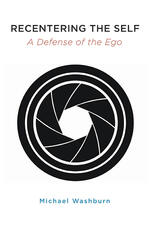
Recentering the Self: A Defense of the Ego (Part 2)
Preview of Results and Conclusions
Guest post by Michael Washburn
In a previous post, I explained how my new book Recentering the Self: A Defense of the Ego evolved from an attempt to defend the ego’s role in spiritual life to a wider reexamination of the ego itself. In this post, I explain how this reexamination led to a revised conception of the ego, which, I believe, improves our understanding of what the ego is, how the ego develops, and why the ego plays an essential role in spiritual life.
The Doubly Two-Sided Ego
Eight core ideas of the revised conception of the ego are stated below. The first four ideas are reformulations (stripped of metaphysical assumptions) of ideas found in modern accounts of the ego. They are most closely associated with Immanuel Kant. The last four ideas are my contributions.
1. The ego is an experiencing subject that unifies consciousness under its individuated viewpoint.
2. The ego is the executive agency of consciousness, specifically an agency that performs cognitive and practical functions.
3. The ego relates to its experiences self-consciously, as experiences that belong to it uniquely and integrally, as parts of what it is.
4. The ego is aware of itself only indirectly, as that which has experiences and performs executive functions and as that which remembers its past and thinks about its future.
5. The ego is the organized form of a neurologically grounded activity that has a characteristic interior phenomenological expression.
6. The ego is one side of two fundamental dualities, these:
- The duality of the interior ego and the worldly self, which consists of the ego as interior subject of consciousness on one side and the ego’s embodied, social self on the other side.
- The duality of agency and spontaneity, which consists of the ego as executive agency of consciousness on one side and the spontaneity of consciousness (the psychic sources from which the internally generated contents of experience arise) on the other side.
7. The ego is the bridging and integrating side of these dualities, the side responsible for facilitating interaction between the sides.
8. That the ego is one side of two fundamental dualities is inherent to its constitution. The ego as subject of consciousness is incomplete without its worldly self, which is already implicit in the activity of which the ego is the organized form. Correspondingly, the ego as executive agency of consciousness cannot function apart from the spontaneity of consciousness, which provides the thoughts, images, and impulses that the ego appropriates and acts on in performing its executive functions.
Ego Development
This revised conception of the ego revealed that ego development, like the ego itself, is doubly two-sided. Ego development is both (1) the development of an interior subject as it monitors, manages, and (to varying degrees) authors its worldly self and (2) the development of an interior agency as it engages, gives focus to, and thus guides the spontaneity of consciousness. Part 2 of Recentering the Self presents an overview of how the ego develops in this doubly two-sided way, as the bridging and integrating side of two fundamental dualities of human experience.
The Ego’s Role in Spiritual Life
Using the revised conception of the ego and the account of ego development based on it, I was finally able to defend the ego’s role in spiritual life. The crux of my defense is as follows: Spiritual literature is frequently critical of the ego because the ego is initially resistant to the profound demands of spiritual life. However, once the ego begins cooperating in its spiritual transformation, it discovers that it makes essential contributions to spiritual life. Most importantly, it learns that it is interdependent with spirit, the power that drives spiritual transformation. The ego depends on spirit for the life-enhancing energy and the life-affirming wisdom and values of spiritual life. In turn, spirit depends on the ego for the conscious perspective, executive functions, and acquired knowledge needed to express itself in the world.
Final Thoughts
Recentering the Self is a much more ambitious project than originally planned. Parts 1 and 2, which were not included in the original plan, required me to delve into areas beyond my primary discipline (philosophy). Nevertheless, I believe that all three parts of the book contribute something of importance to our understanding of the ego. I invite readers to join me in my endeavor to understand the ego, an essential but misunderstood part of our being.
Michael Washburn is Professor Emeritus of Philosophy at Indiana University South Bend. He is the author of Embodied Spirituality in a Sacred World, The Ego and the Dynamic Ground: A Transpersonal Theory of Human Development, and Transpersonal Psychology in Psychoanalytic Perspective, all published by SUNY Press.
Credit: OpenAI’s ChatGPT provided helpful suggestions when I was revising drafts of this post.


